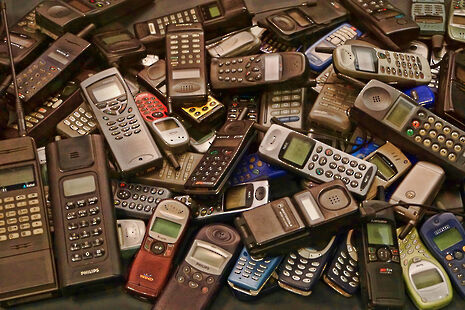Buying a brick phone is an act of self-care
Downgrading your mobile phone can have surprising benefits for both mental health and productivity, writes Harriet Phillips

Yes, that’s right. You didn’t misread the title. I am indeed the proud owner of a Nokia 3310 3G. And no, it isn’t a stopgap, soon to be replaced by the next hi-tech overpriced monstrosity which Apple chooses to chuck at us. I bought my brick phone because its predecessor had ceased to function, and I wanted something a little bit different.
It all started back in the summer, when I spent two weeks in an environment where nature was plentiful, but WiFi, sadly, was not. When it initially hit me that I wouldn’t be able to get my daily Facebook fix, I was surprised to find that I wasn’t really bothered. I wouldn’t keep in touch with friends from home for a couple of weeks, but that would give us all the more to talk about when we finally saw each other in person.
And so the two-week trial began. The first thing I noticed was my fellow travellers’ comically absurd behaviour: wherever internet was available, they would grab their phones and desperately tap in the Wi-Fi code, pacing up and down frantically. They would spend 10-15 minutes in a trance, silently scrolling, replying to messages and trying to upload candids of: a) blurry local wildlife, b) snoring roommate caught unawares or c) impressive but repulsive insect bites.
“Buying this phone was a truly wonderful act of self-care”
Much to my surprise, this pack behaviour didn’t trigger any envious FOMO. I was in blissful ignorance of the world, and that suited me just fine. What I did notice, however, was a distinct improvement in my mood. This gave me pause for thought, and I was almost reluctant to tap that dreaded mobile data icon as I exited Heathrow two weeks later.
Sadly, this two-week interlude soon became a hazy memory as Michaelmas muscled in. My mind was taken up with such important things as essay deadlines, and trying to remember my college children’s names, and I would have probably slipped back to my old scroll-happy ways if it hadn’t been for one thing: my 2-year-old Samsung decided to kick the bucket, and I was left phoneless.
Believing this should be remedied immediately, I began searching for a new phone, taking advantage of my supervisor’s inability to see through the back of my laptop. I rather thought I’d push the boat out, and buy the model up from my old phone. What a silly person I was. I heard my account balance muttering unpleasant truths, which soon put a stop to aforementioned wishful thinking.
After briefly (very briefly) considering going without a phone altogether, I mused about what would be the next best thing. Of course! A brick phone. I still have fond memories of playing man-move-the-box on my mother’s now-archaic nifty little Siemens A55.
“We all know how easily phones can be used as a social crutch”
I took the metaphorical plunge. Went to phone shop, asked for brick phone, convinced baffled sales assistant this was to be my new phone, not some temporary measure, persuaded them that this was in fact a good idea, bought it, and set off home, with a slow-fizzing excitement in the pit of my stomach.
I’ve never looked back since. Buying this phone was a truly wonderful act of self-care. Why? Because, among other things, my mental health has improved tenfold since slinging the Samsung. I have increased concentration, I am more productive, and I somehow have so much free time! It’s not really that hard to figure out. On my new brick I can only call or text, so I just use it when out and about, and when I absolutely have to. Otherwise, I do two admin sessions a day, conducting all social correspondence via a mixture of Facebook and email. Mindlessly scrolling is now a thing of the past.
Perhaps the more melancholic side to this newfound life is that I have become all too aware of our generation’s mobile phone dependency. If we were to undergo medical analysis, I’m sure most of us would be diagnosed with dependence, if not addiction to our mobiles.
“Phones are incredibly powerful tools for exclusion”
We all know how easily phones can be used as a social crutch. You’re in a public place, waiting for friends, don’t want to look like a loner. What do you do? Whip out the phone. You’re at a party where the only person you vaguely know has just gone to the loo. What do you do? Whip out the phone. You’re in Sainsbury’s, catch sight of someone you really don’t want to talk to. Again, the phone to the rescue.
Beyond this, phones are incredibly powerful tools for exclusion. Imagine you’re having a conversation with someone and they get out their phone. They stop actively conversing with you, and express themselves purely through monosyllabic grunts, throwing in the occasional ‘I know right’ for variety. They are essentially telling you that they couldn’t care less about you, and that they’d much rather be somewhere else, talking to someone else.
I do not intend to shame-face our generation because of the way we have interacted with technological developments out of our control. I also don’t expect you all to bin your smartphones in favour of a Nokia brick, and run off into the rosy sunset. I would, however, like to invite you to consider your relationship with your phone, and with technology in general. Is it sustainable? Is it fulfilling? Most importantly, does it make you happy?
I know what makes me happy. Good food, a warm bed: creature comforts are fundamental. On a spiritual level, good music and good people are essential. In an environment like Cambridge which forces us to isolate ourselves, human interaction is vital. This isn’t interaction via Messenger, or SnapChat, or Twitter. This is convivial cups of tea, hugs, shared laughter and tears. This is belonging
 News / Judge Business School advisor resigns over Epstein and Andrew links18 February 2026
News / Judge Business School advisor resigns over Epstein and Andrew links18 February 2026 News / Hundreds of Cambridge academics demand vote on fate of vet course20 February 2026
News / Hundreds of Cambridge academics demand vote on fate of vet course20 February 2026 News / Petition demands University reverse decision on vegan menu20 February 2026
News / Petition demands University reverse decision on vegan menu20 February 2026 News / CUCA members attend Reform rally in London20 February 2026
News / CUCA members attend Reform rally in London20 February 2026 News / Gov grants £36m to Cambridge supercomputer17 February 2026
News / Gov grants £36m to Cambridge supercomputer17 February 2026










